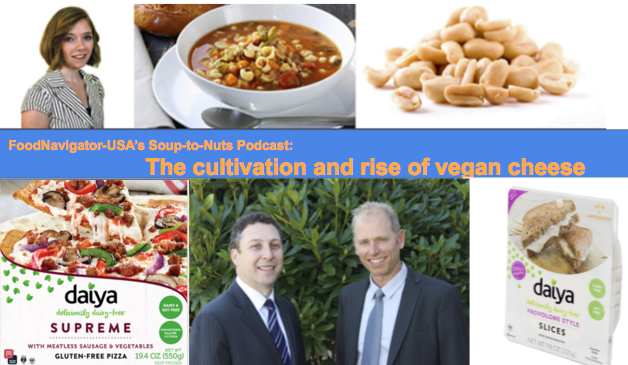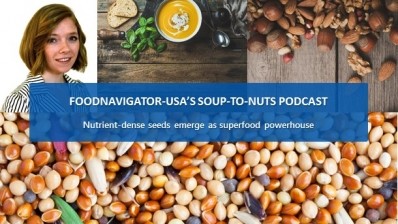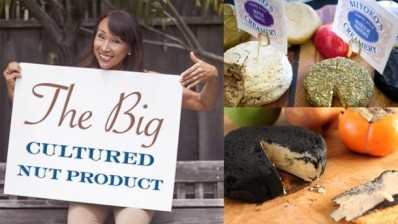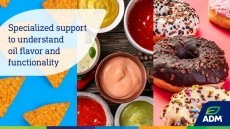Soup-To-Nuts Podcast: The cultivation and rise of vegan cheese alternatives

A quick glance at some of the growth figures in vegan over the past year underscore the strides plant-based is making. According to Google Trends data released at the start of 2016, vegan was one of the top associated keywords in searches.
Drilling down, Google found searches for vegan cheese were up 80% from the prior year, while searches for vegan mac & cheese were up 69%, vegan ice cream 109% and vegan chocolate 89%.
To find out what is driving this spike in vegan, as well as where there is white-space, saturation and how veganism will evolve in the future, this episode of FoodNavigator-USA’s Soup-To-Nuts Podcast features Andre Kroecher, who along with Greg Blake co-founded the plant-based, dairy free manufacturer Daiya.
When Daiya first launched in 2009, the vegan CPG scene was grim. But its Cheddar Style and Mozzarella Style shreds, helped revolutionize the market and point the industry in the direction of where it is today.
“Back in 2008 and 2009, it was very different than what we see today,” Kroecher said. “Back then products that were what we call plant-based you would have to be quite desperate to try and consume them.”
But that doesn’t mean that there wasn’t demand for products that vegetarians and vegans could eat to be “like everyone else,” he said.
He explained that when Daiya first made its meltable Cheddar and Mozzarella style shreds the vegan cheese on the market didn’t melt and it wasn’t user friendly. Or worse yet, most of the time it wasn’t even vegan.
“The category back then was called soy cheese or cheese alternative so really it was all soy based and the soy cheeses were often still dairy based or milk based products. Milk protein was literally the second ingredient after water,” Kroecher explained.
Not only was this a no-go for vegans, it didn’t work for people who were allergic to soy. And Kroecher said it was important to Daiya that its products not only meet vegan’s needs but those of people who suffer from the top eight allergens.
By expanding the consumer base and providing a product that actually was a) vegan, b) melted and c) had flavor, Daiya quickly became an underground success. The company originally sold into food service, prompting consumers to buy plastic baggies of the shreds at pizza shops.
“To our surprise it turned into a frenzy of a black market. It was just incredible,” Kroecher said. And unsustainable because the company couldn’t control the quality of repackaged product, which prompted it to explore the retail side of the business, he added.
Daiya quickly expanded beyond just shreds, to develop mac & cheese, pizzas, yogurts and other in demand dairy free products -- a move that has paved the way for the rest of the industry to follow.
“Now what we are seeing is all kinds of diverse offerings from small diverse companies and niche brands. ... We are seeing hemp, cashew, walnut -- all of these alternatives, pea protein, there are just a ton of them. Coconut. An explosion of coconut!” Kroecher said.
As excited as he is by the innovations, he says Daiya still stands apart as offering not only dairy free options, but products that are free of the top eight allergens, including nuts which are often used in artisan alternatives to dairy cheese.
Three main drivers of vegan
Reflecting on the past several years and the recent spike in consumer interest in vegan, Kroecher said the uptick can be attributed to three main factors.
“The first one is the environment,” he said. “There are green consumers who we call conscious consumers” who are focused on the environmental impact of food production, including water use, methane production and soil health -- all of which are impacted more negatively by animal production.
“The next one is some people are concerned about cholesterol and blood pressure and Western diseases that might be associated with some of the Western eating habits” of high animal product consumption, he said.
“And the third is compassion and loving of animals,” he said. “What I noticed in this new generation coming up is there are fewer people having children -- especially if they are a little bit more affluent and doing well they consider the choice to have children very carefully. And those same people are booming with pets. The dogs, the cats and there is more pet insurance. … What that shows us is that people are bonding to animals and when they bond to animals they see their personality and … start thinking about what they are eating” and the difference between their pets and animal-based food.
The future is bright for plant-based
As far as the vegan or plant based food and beverage category has come, there is still plenty of room for new product development, Kroecher said.
“If you pick up the menu of even a very forward, innovative restaurant you will be lucky if you can find anything other than a salad that is plant-based, and usually the dressing will still be egg and dairy,” he said.
He said Daiya is trying to do its part by offering creamy vegan dressings and cheese slices that restaurants can use to make vegan sandwiches more than lettuce, tomato and cucumber.
But there are still gaps in the string cheese category, stuffed ravioli or lasagna and plenty of other places.
Kroecher concluded that Daiya eventually wants to be everywhere there currently is “nothing to eat” for vegans.


















